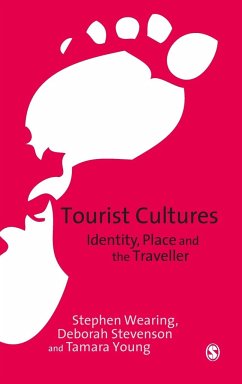This is a timely and easily accessible book that addresses a number of issues that are of central concern to the development of tourism studies. It will also be of interest to those in cultural studies, social geography and social anthropology who are concerned with the relationship between the production and consumption of place.
- Kevin Meethan, University of Plymouth
Sharp and engaging, Tourist Cultures presents valuable critical insights into tourism - arguing that within the imagined-real spaces of the traveller self it becomes possible to envisage tourist cultures and futures that will both empower and engage.
Here is a framework for understanding tourism which is subject-centred, dynamic, and capable of dealing with the complexity of contemporary tourist cultures. The book argues that tourists are not passive consumers of either destinations or their interpretations. Rather, they are actively occupied in a multi-sensory, embodied experience.
It delves into what tourists are looking for when they travel, be they on a package tour, or immersing themselves in the places, cultures and lifestyles of the exotic. Tourism is examined through a consideration of the spaces and selves of travel, exploring the cultures of meaning, mobilities and engagement that frame and define the tourist experience and traveller identities.
This book draws on the explanatory traditions of sociology, human geography and tourism studies to provide useful insights into the experiential and the lived dimensions of tourism and travel. Written in an accessible and engaging style, this is a welcome contribution to the growing literature on tourism and will be important reading for students in a range of social science and humanities courses.
- Kevin Meethan, University of Plymouth
Sharp and engaging, Tourist Cultures presents valuable critical insights into tourism - arguing that within the imagined-real spaces of the traveller self it becomes possible to envisage tourist cultures and futures that will both empower and engage.
Here is a framework for understanding tourism which is subject-centred, dynamic, and capable of dealing with the complexity of contemporary tourist cultures. The book argues that tourists are not passive consumers of either destinations or their interpretations. Rather, they are actively occupied in a multi-sensory, embodied experience.
It delves into what tourists are looking for when they travel, be they on a package tour, or immersing themselves in the places, cultures and lifestyles of the exotic. Tourism is examined through a consideration of the spaces and selves of travel, exploring the cultures of meaning, mobilities and engagement that frame and define the tourist experience and traveller identities.
This book draws on the explanatory traditions of sociology, human geography and tourism studies to provide useful insights into the experiential and the lived dimensions of tourism and travel. Written in an accessible and engaging style, this is a welcome contribution to the growing literature on tourism and will be important reading for students in a range of social science and humanities courses.
'This book makes an important contribution to understanding the experiences of tourists with places, spaces and peoples. Focusing on the multi-faceted, dynamic nature of host-guest interactions, it offers a trenchant critique of subject-object dualities and opens a dialogue for a sustainability-oriented approach to the travel and tourism encounter' - Tazim Jamal, Associate Professor, Department of Recreation, Park and Tourism Sciences, Texas A&M University
'This is a timely and easily accessible book that addresses a number of issues that are of central concern to the development of tourism studies. It will also be of interest to those in cultural studies, social geography and social anthropology who are concerned with the relationship between the production and consumption of place' - Kevin Meethan, University of Plymouth
'This is a timely and easily accessible book that addresses a number of issues that are of central concern to the development of tourism studies. It will also be of interest to those in cultural studies, social geography and social anthropology who are concerned with the relationship between the production and consumption of place' - Kevin Meethan, University of Plymouth

